Thu 14 Aug 2008
MIKE NEVINS on Anthony Boucher and Manfred B. Lee.
Posted by Steve under Authors , Columns , Old Time Radio[3] Comments
by Francis M. Nevins
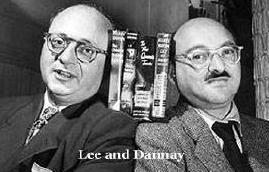
As all mysteryphiles know, “Ellery Queen” was both the joint byline of first cousins Frederic Dannay (1905-1982) and Manfred B. Lee (1905-1970) and the brilliant sleuth who starred in most of their mysteries.
It’s also well known that, for all but the first years of their long joint career, Fred’s function was to devise lengthy plot synopses which Manny would flesh out to novel or story length.
This was their division of labor when the Ellery Queen radio series debuted on CBS in the summer of 1939. What was not known outside the inner circle was that, after his first wife died of cancer in 1945, Fred was so overwhelmed with raising their two small children and keeping Ellery Queen’s Mystery Magazine afloat that he simply couldn’t continue coming up with new plots.
After a few false starts, the writer chosen to take over much of Fred’s function on the series was Anthony Boucher (1911-1968). Since Tony lived in Berkeley, California and Manny on the East Coast, the arrangement required correspondence between them on almost a daily basis. That correspondence, which rivals Gone with the Wind in word count, is preserved at Indiana University’s Lilly Library.
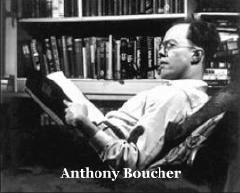
I’ve made several trips to Bloomington to immerse myself in those letters, which are fabulously interesting for any number of reasons. Some of them are close to indecipherable since they deal with the plot minutiae of radio dramas that have apparently ceased to exist in audio form.
But the rest! Working at opposite ends of the country and under wartime and immediate post-war traveling conditions, Tony and Manny almost never met in person. But from their correspondence alone the devout Catholic and the agnostic Jew grew to be closer than brothers, and their letters range all over the map, from the health problems of their children to Hiroshima and the Cold War and anti-Semitism.
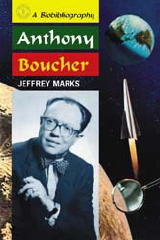
Manny’s letters tend to be much longer and more irascible and clearly he was using them to vent. His rants about the confederacy of dunces he had to deal with in the broadcasting world offer some remarkable insights into the medium – as long as one keeps in mind that, being a classic type A personality and a past master at getting hot under the collar, he may not have been the most objective witness in the world.
During much of his time collaborating with Manny, Boucher was also writing scripts for the Sherlock Holmes radio series, which between 1939 and 1946 starred Basil Rathbone and Nigel Bruce, the Holmes and Watson of Universal’s movie series.
“Compared to EQ, Holmes scripts practically write themselves,” he told Manny in one letter (13 September 1945), “and the EQ occupies by far the major portion of my working week…. You have no idea of the number of ideas that I worked on for days only to reject because I discovered an ineradicable flaw that would exasperate you….”
As if to reassure Manny that he wasn’t the only man in radio who was surrounded by jerks, Boucher in his letters often recounted his travails with the Holmes program.
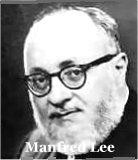
“On Holmes, either my collaborator [Denis Green] or I am – is – I hate that kind of sentence – one of us is present at every rehearsal-and-broadcast. And a good thing, we find: not only directors but star actors can get the damndest ideas they have to be gently talked out of.” (28 January 1945)
“We do at least have a first-rate man at the control board; but our sound technicians are two of the clumsiest louts that ever held a union card and all the things about time for commercials and cutting dialog to the bone… God does all that happen regularly to us. Especially since the sponsor switched announcers on us because the new one reads slower!” (5 July 1945)
But these problems were as nothing compared with what happened at the beginning of the 1946-47 season, when Rathbone left the series for the Broadway stage and was replaced by Tom Conway. “The new producer on the show … is a pretentious and arrogant boor with a great deal of very real talent for production and writing – in some ways the ablest (and also the most offensive) man I have known in radio. He is convinced that only he knows anything about Holmes…
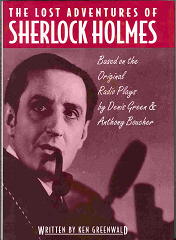
“He is bent on reducing Holmes to the simple formula of heavy melodrama and heavier low comedy that has driven Holmes enthusiasts screaming from their radios and theaters. And he assumes automatically that his duties as producer include replotting and rewriting of all scripts….” (14 October 1946)
“My favorite enemy … with his constant miscasting, his incredibly inept music, and his campaign of forcing me [and Denis Green] off and replacing us by astonishing scripts from his ex-wife and a protégé, has succeeded finally in driving Holmes off the air…. I don’t know what this will mean. The director will try to argue that this is all simply due to Rathbone’s absence. But if [he] is kept on the show … I’m pretty certain to be entirely off Holmes in the fall.” (30 June 1947)
“Did you read in the trades what’s happened to Holmes? It’s been sold to a cheap NY outfit, to be an extreme low-budget show – cheap production, no actors over scale (including Holmes & Watson), scripts for pennies – and $1,000 a week to Denis PS Conan Doyle [who was Sir Arthur’s son and one of his literary executors].”(25 July 1947)
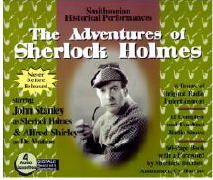
Taking over the parts of Holmes and Watson were the long-forgotten John Stanley and Alfred Shirley. “I’m definitely out on Holmes – not even a hope of some income from repeats… I think this may be the most severe fatality Holmes has suffered since the Reichenbach Falls – but then he survived even that…” (12 August 1947)
As far as I know, no Sherlockian has ever delved into Boucher’s running commentary on the Holmes radio series, but it’s a job eminently worth doing. And so is the assembling of a full-length book of the Boucher-Lee correspondence, which chronicles one of the strongest, deepest, most fascinating literary friendships of the 20th century and, in the world of mystery fiction, perhaps the strongest and most fascinating of all.
August 15th, 2008 at 5:19 am
Excellent article as usual Mike. Any chance of you doing the book on the Boucher-Lee correspondence? This is a project that must see publication.
August 15th, 2008 at 5:34 pm
Mike, as always, a wonderful piece on 2 fascinating men.
August 15th, 2008 at 10:15 pm
This was a very interesting and informative article.
Would like to read much more of this correspondence.